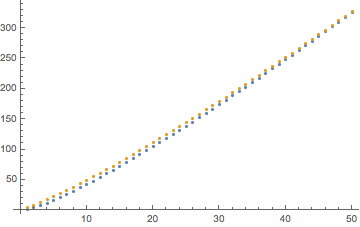Consider the space $\mathrm{SU}(2)^\natural$ of conjugacy classes in $\mathrm{SU}(2)$. It has a natural identification with the interval $[0,\pi]$ with Haar measure $\frac{2}{\pi} \sin^2\theta\, \mathrm{d}\theta$, via the mapping $$ \theta \mapsto x_\theta = \begin{pmatrix} e^{i\theta} \\ & e^{-i\theta}\end{pmatrix} . $$ Under this identification, the map $U_k\colon \mathrm{SU}(2)^\natural \to \mathbf{R}$ given by $U_k(x) = \mathrm{tr}(\mathrm{sym}^k x)$ is $$ U_k(\theta) = \frac{\sin((k+1)\theta)}{\sin(\theta)} . $$
I am wondering: is the exact value of the total variation of the functions $U_k$ known? In this context, this means: is there an exact formula (or asymptotic for) $$ \int_0^\pi |U_k'(\theta)|\, \mathrm{d}\theta ? $$
More generally, for $G$ a compact Lie group, we can identify $G^\natural$ with a quotient of Euclidean space via $\exp\colon \mathfrak{t} \to G^\natural$ for $\mathfrak{t}$ the Lie algebra of a maximal torus. Is there any reasonable formula for the total variation of the trace of an irreducible representation of $G$, in terms of the corresponding highest weight?


